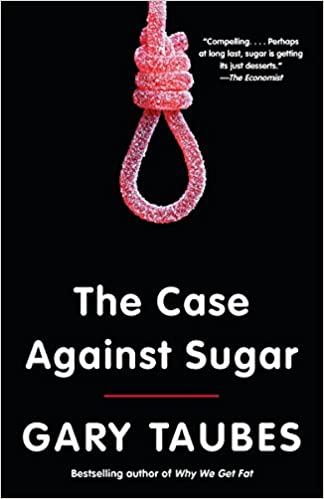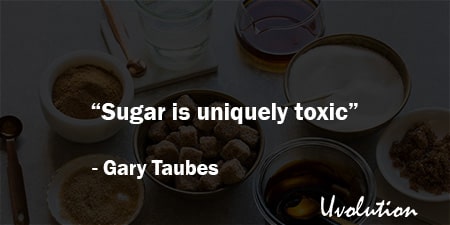The Case Against Sugar by Gary Taubes Summary
The Book in 1 Sentences
“The purpose of this book is to present the case against sugar—both sucrose and high-fructose corn syrup—as the principal cause of the chronic diseases that are most likely to kill us, or at least accelerate our demise, in the twenty-first century.
Its goal is to explain why these sugars are the most likely suspects, and how we arrived at the current situation: a third of all adults are obese, two-thirds are overweight, almost one in seven is diabetic, and one in four to five will die of cancer; yet the prime suspects for the dietary trigger of these conditions have been, until the last decade, treated as little worse than a harmless pleasure.
If this were a criminal case, The Case Against Sugar would be the argument for the prosecution.”~ Gary Taubes
7 BIG Ideas
The Case Against Sugar Book Summary
1. Sugar is a long-term toxin!
“This book makes a different argument: that sugars like sucrose and high-fructose corn syrup are fundamental causes of diabetes and obesity, using the same simple concept of causality that we employ when we say smoking cigarettes causes lung cancer.
It’s not because we eat too much of these sugars—although that is implied merely by the terms ‘overconsumption’ and ‘overeating’— but because they have unique physiological, metabolic, and endocrinological (i.e., hormonal) effects in the human body that directly triggers these disorders.
This argument is championed most prominently by the University of California, San Francisco, pediatric endocrinologist Robert Lustig. These sugars are not short-term toxins that operate over days and weeks, by this logic, but ones that do their damage over years and decades, and perhaps even from generation to generation.”
2. One prime suspect: Sugar
“If this were a criminal investigation, the detective assigned to the case would start from the
assumption that there was one prime suspect, one likely perpetrator, because the crimes (all the aforementioned diseases) are so closely related.
They would only embrace the possibility that there were multiple perpetrators when the single-suspect hypothesis was proved insufficient to explain all the evidence. Scientists know this essential concept as Occam’s Razor.
When Isaac Newton said, ‘We are to admit no more causes of natural things than such as are both true and sufficient to explain their appearances,’ he was saying the same thing that Albert Einstein, three centuries later, said (or was paraphrased as saying): ‘Everything should be made as simple as possible, but no simpler.’
We should begin with the simplest hypothesis, and only if that can’t explain what we observe should we consider more complicated explanations—in this case, multiple causes.”
“So here’s the if/then hypothesis. If these Western diseases are associated with obesity, diabetes, insulin resistance, and metabolic syndrome, which many of them are, then whatever causes insulin resistance and metabolic syndrome is likely to be the necessary dietary trigger for the diseases, or at least a key player in the causal pathway.
Because there is significant reason to believe that sugars—sucrose and high-fructose corn syrup in particular, the nearly fifty-fifty combinations of glucose and fructose—are the dietary trigger of insulin resistance and metabolic syndrome, it’s quite likely they are a primary cause of all these Western diseases, including, as we’ll discuss, cancer and Alzheimer’s disease.
Without these sugars in the diet, these chronic diseases would be relatively rare, if not, in some case, virtually nonexistent.”
Shocking fact!
“‘We now eat in two weeks the amount of sugar our ancestors of 200 years ago ate in a whole year,’ as the University of London nutritionist John Yudkin wrote in 1963 of the situation in England.”
3. Sugar act like a drug!
“Sugar does induce the same responses in the region of the brain known as the ‘reward center’— technically, the nucleus accumbens—as do nicotine, cocaine, heroin, and alcohol.
Addiction researchers have come to believe that behaviors required for the survival of the species— specifically, eating and sex—are experienced as pleasurable in this part of the brain, and so we do them again and again.
Sugar stimulates the release of the same neurotransmitters—dopamine in particular—through which the potent effects of these other drugs are mediated. Because the drugs work this way, humans have learned how to refine their essence into concentrated forms that heighten the rush.
Coca leaves, for instance, are mildly stimulating when chewed, but powerfully addictive when refined into cocaine; even more so taken directly into the lungs when smoked as crack cocaine.
Sugar, too, has been refined from its original form to heighten and concentrate its effects, albeit as a nutrient that provides energy as well as a chemical that stimulates pleasure in the brain.”
4. “Energy balance” theory is wrong
“The second pillar of modern nutritional wisdom is far more fundamental and ultimately has
had far more influence on how the science has developed, and it still dominates thinking on the sugar issue. As such, it has also done far more damage.
To the sugar industry, it has been the gift that keeps on giving, the ultimate defense against all arguments and evidence that sugar is uniquely toxic. This is the idea that we get obese or overweight because we take in more calories than we expend or excrete.
By this thinking, researchers and public-health authorities think of obesity as a disorder of ‘energy balance,’ a concept that has become so ingrained in conventional thinking, so widespread, that arguments to the contrary have typically been treated as quackery, if not willful disavowal of the laws of physics.
According to this logic of energy balance, or calories-in/calories-out, the only meaningful way in which foods we consume have an impact on our body weight and body fat is through their energy content—calories.
This is the only variable that matters. We grow fatter because we eat too much—we consume more calories than we expend—and this simple truth was, and still is, considered all that’s necessary to explain obesity and its prevalence in populations.
This thinking renders effectively irrelevant the radically different impact that different macronutrients—the protein, fat, and carbohydrate content of foods—have on metabolism and on the hormones and enzymes that regulate what our bodies do with these foods:
whether they’re burned for fuel, used to rebuild tissues or organs, or stored as fat.”
“Almost sixty years later, when the Times reported in 2015 that academic researchers were doing the bidding of Coca-Cola by taking its money to fund a Global Energy Balance Network (GEBN) and ‘shift blame for obesity away from bad diets,’ this was still the argument researchers would invoke in their defense.
‘Mainstream scientists understand that obesity is caused by a calorie surplus due to
over-eating or under-exercising.’ And anyone who didn’t know this was either a quack or at
best held a ‘fringe view.’”
A calorie is NOT a calorie
Mark Hyman - in Eat Fat, Get Thin book - says: “The conventional wisdom doesn’t stack up against the emerging research that shows us that a calorie is not a calorie (when you eat it). In a vacuum or a lab, calories from all foods release the same amount of energy when burned—whether the food is coconut oil or honey.
But when you eat, foods have to go through your body, and they can have profoundly different effects on your hormones, brain chemistry, and metabolism.
Fat calories burn differently than sugar calories do. Fat calories speed up your metabolism. Fats have to be burned and are not easily stored because they don’t spike insulin—the fat storage hormone.
Fat works on the brain to cut your appetite so you eat less overall during the day. On the other hand, sugar and carb calories do exactly the opposite: They spike insulin, promote fat storage, and are quickly laid down as dangerous belly and organ fat.
They slow your metabolism and increase hunger and cravings. Mounds of scientific research support this perspective.
This hormonal or metabolic hypothesis of weight gain supports the idea that it is the
composition and quality of the foods you eat (and the hormones and biochemistry they
subsequently trigger) that determine whether you lose or gain weight.
In other words, it is not how much you eat but what you eat that controls the metabolic switches.”
5. Sugar is a chronic toxin
“So the answer to the question of whether sugar, in the form of sucrose and HFCS [high-fructose corn syrup], is the primary cause of insulin resistance and metabolic syndrome and therefore obesity, diabetes, and heart disease is: it certainly could be.
The biological mechanisms that were elucidated by the 1970s make it clear that sugar is a prime suspect and should have been all along. The damage that these sugars do, their toxicity, would take years to accumulate and manifest themselves as disease.
This wouldn’t necessarily happen to everyone who ingested them (just as cigarette smoking doesn’t cause lung cancer in everyone), but the biology suggests that when insulin resistance and metabolic syndrome appear, these sugars are the likely cause.
The greater leap of faith, in this case, would be to assume that the sugars are harmless.
And if sugars cause insulin resistance, as the evidence suggests, there are all-too-regrettable
implications.”
6. Sugar fuels tumor growth!
“But the other way to initiate the cancer process, according to these researchers, is to increase the levels of insulin and blood sugar in the circulation itself. Insulin resistance would do that.
Thus whatever is causing insulin resistance would be promoting the transformation of healthy
cells into malignant, metastic cells by increasing insulin secretion and elevating blood sugar and telling the cells to take up increasingly more glucose for fuel.
This leads those like Cantley and Thompson directly back to sugar. As Cantley has said, sugar
‘scares’ him, for precisely this reason. If the sugars we consume—sucrose and HFCS specifically—cause insulin resistance, then they are prime suspects for causing cancer as well, or at the very least promoting its growth.
Even if the details of the mechanism should turn out to be wrong, the association between obesity, diabetes, and cancer, and the specific association between insulin, IGF, and cancer, suggests that whatever is causing insulin resistance is increasing the likelihood that we will get cancer.
If it’s sugar that causes insulin resistance, it’s hard to avoid the conclusion that sugar causes cancer, radical as this may seem, and even though this suggestion is rarely if ever voiced publicly.”
Tom Rath’s -in Eat Move Sleep book - also says: “Sugar is a toxin. It fuels diabetes, obesity, heart disease, and cancer. At the current dose we consume, more than 150 pounds per
person every year, sugar and its derivatives kill more people than cocaine, heroin, or any other
controlled substance around.
One report aptly describes sugar as ‘candy for cancer cells.’ It accelerates aging and
inflammation in the body and subsequently fuels tumor growth. It is now clear that if you
lower your sugar intake, you reduce your odds of developing cancer.”
7. How little is too much?
“To understand this tautological logic better, imagine a situation in which cigarette smokers who don’t get lung cancer (or heart disease or emphysema) assume de facto that those smokers who do are those who smoke ‘too much.’
They’d certainly be right, but it still wouldn’t tell us what constitutes a healthy level of smoking or whether such a thing as smoking in moderation even exists.
How many cigarettes could be smoked without doing at least some harm to our health, and could thus constitute smoking in moderation? If we say none, we may, indeed, be right, but
now we’ve redefined how we’re willing to work with the concept of moderation.
The same logic may also apply to sugar. If it takes twenty years of either smoking cigarettes or consuming sugar for the consequences to appear, how can we know whether we’ve smoked or consumed too much before it’s too late?
Isn’t it more reasonable to decide early in life (or early in parenting) that not too much is as little as possible?”
“Ultimately and obviously, the question of how much is too much becomes a personal decision, just as we all decide as adults what levels of alcohol, caffeine, or cigarettes we’ll ingest.
I’ve argued here that enough evidence exists for us to consider sugar very likely to be a toxic substance, and to make an informed decision about how best to balance the likely risks with the benefits.”
That was my QUICK summary of the great book The Case Against Sugar by Gary Taubes. If you’re interested, get your copy. There is a HUGE amount of life-changing ideas in this book, and we’ve only touched on a tiny bit of it.
Buy The Book: The Case Against Sugar by Gary Taubes

GET Blinkist 7 Days FREE Trial
3000+ Book Summaries
(Audio and Text)








